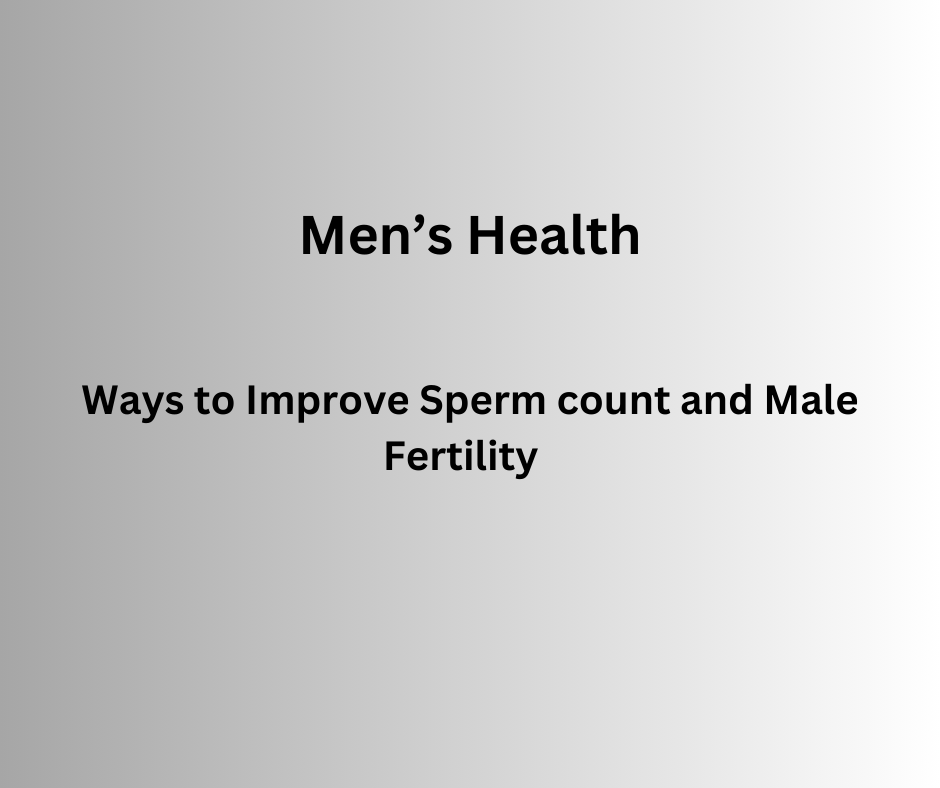
How to Increase Sperm Count and Boost Male Fertility
Boosting Sperm Count: Strategies, Nutrients, and Lifestyle Changes
Infertility affects a substantial number of couples, and low sperm count is a common underlying issue. Fortunately, there are various methods to improve sperm count, including dietary adjustments, lifestyle changes, and medical interventions. Today we will explore the role of antioxidants, zinc, selenium, folic acid, vitamin E, and vitamin B12, as well as the impact of smoking and alcohol consumption, and the role of medications and hormones in enhancing sperm count.
- Nutritional Support:
a. Antioxidants: Antioxidants play a crucial role in protecting sperm from oxidative stress and damage. Oxidative stress can impair sperm quality and quantity. Vitamins C and E, selenium, and coenzyme Q10 are powerful antioxidants that help reduce this damage. Incorporating a diet rich in fruits, vegetables, nuts, and seeds can provide the necessary antioxidants to support sperm health.
b. Zinc: Zinc is an essential mineral for sperm production and motility. A deficiency in zinc can lead to low sperm count and poor sperm quality. Consuming zinc-rich foods like lean meats, nuts, and whole grains or taking zinc supplements under medical supervision can help address this deficiency.
c. Folic Acid (Vitamin B9): Folic acid is vital for DNA synthesis and repair, both of which are critical for healthy sperm development. A deficiency in folic acid can result in abnormal sperm and reduced sperm count. Including folic acid-rich foods such as leafy greens, beans, and fortified cereals can be beneficial. Consult a healthcare professional for recommended folic acid supplements if needed.
d. Vitamin E: Vitamin E, an antioxidant, shields sperm from oxidative damage and supports their motility. Nuts, seeds, and vegetable oils are good sources of vitamin E, while supplementation should be done under medical guidance to determine the appropriate dosage.
e. Vitamin B12: Vitamin B12 is crucial for sperm production and overall reproductive health. A deficiency in vitamin B12 can lead to reduced sperm count and impaired sperm motility. Consuming foods like lean meats, fish, dairy products, and fortified cereals can help meet your vitamin B12 needs. Consult your andrologist or fertility specialist or gynaecologist for guidance on vitamin B12 supplementation if necessary.
- Lifestyle Changes:
a. Quitting Smoking: Smoking is associated with reduced sperm count and sperm motility. The harmful chemicals in cigarettes can damage sperm DNA and impair fertility. Quitting smoking can significantly improve sperm count and overall reproductive health.
b. Reducing Alcohol Consumption: Excessive alcohol intake is linked to decreased testosterone levels and impaired sperm production. Moderating alcohol consumption or abstaining altogether can help improve sperm count and quality.
- Medications and Hormones:
In some cases, medications and hormones may be prescribed to address specific causes of low sperm count, such as hormonal imbalances. Medications like clomiphene citrate, Letrozole and human chorionic gonadotropin (hCG) can stimulate the testes to produce more sperm. Human chorionic gonadotropin may be used in individuals after varicocele surgery and with androgen deficiency. Combinations of fsh and hcg may be used in idiopathic normogonadotrophic oligospermia on a thrice a week or weekly schedule .
b. Surgery: In cases of obstructive azoospermia, where a physical blockage prevents sperm from reaching the ejaculate, surgical procedures can be performed to correct the issue.
c. Assisted Reproductive Technologies (ART): In cases of severe male infertility, ART procedures such as in vitro fertilization (IVF) and intracytoplasmic sperm injection (ICSI) can help couples achieve pregnancy.
Enhancing sperm count is a multifaceted journey that involves a combination of dietary changes, lifestyle modifications, and medical interventions. Nutrients like antioxidants, zinc, folic acid, vitamin E, and vitamin B12 play vital roles in supporting sperm health. Quitting smoking and moderating alcohol intake can significantly improve sperm count, while medications and hormones may be required in specific cases.
Remember, it's essential to consult a fertility specialist, andrologist or mens health specialist before making significant lifestyle or medication changes to ensure that the chosen approach aligns with your individual needs and health conditions. By taking these steps, many individuals can boost their sperm count and increase their chances of successfully achieving their family-building goals. Here at Chawla nursing home and maternity hospital Jalandhar Punjab we have a dedicated team working on mens health , fertility issues and con be contacted on +917307103001,9023703001.

